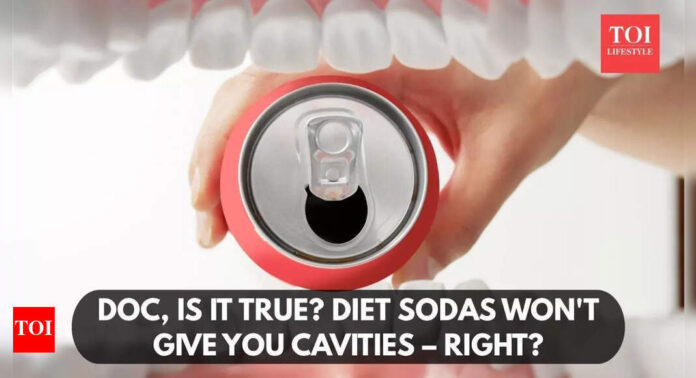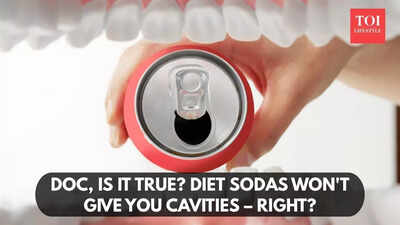The claim: Since diet sodas are sugar-free, they won’t cause cavities.Unless you’re living under a rock, you’ve noticed the influx of health-related videos flooding social platforms. From fibremaxxing to Sunday resets, wellness trends are ruling the internet — thanks to Gen Z, who are far more health-conscious than millennials, Gen X’ers, Baby Boomers, and the Silent Generation. But while some of these wellness trends are genuinely beneficial, others are built on half-truths that sound convincing until you dig deeper.Take diet soda, for instance. Youngsters and adults are equally obsessed with the sugar-free, low-calorie drink. One claim that’s taking the internet by storm: diet sodas won’t give you cavities. The logic seems bulletproof — a beverage sans sugar means cavity-causing bacteria starve. But is it really that simple?We asked Dr Baiju Hariharan, a dental surgeon with nearly three decades of clinical experience, based in Haripad, Kerala, to separate fact from fiction.Is it true that diet sodas don’t cause cavities?The verdict: FALSEMany believe that ditching regular soda for diet soda will keep cavities at bay. No sugar means nothing for cavity-causing bacteria to feast on, right? “Not really,” Dr Hariharan said in an interview with The Times of India.While many people are aware that sugary beverages are bad for the teeth, many believe switching to diet sodas is a ‘healthier’ option. “It’s a misconception that diet sodas won’t lead to cavities. Switching to diet sodas alone won’t save your teeth,” the doctor explains.“Just because it’s sugar-free doesn’t necessarily mean it’s safe for teeth,” he adds.Though diet sodas do not promote cavities in the same way regular sodas do, they can still damage the enamel due to their acidity.A 2015 study by researchers at Melbourne University’s Oral Health Cooperative Research Centre found that sugar-free counterparts are not great for your teeth either. Avoiding sugar-laden soft drinks may be great for your waistline, but that alone cannot reduce the risk of dental decay.“Many people are not aware that while reducing your sugar intake does reduce your risk of dental decay, the chemical mix of acids in some foods and drinks can cause the equally damaging condition of dental erosion,” Eric Reynolds, CEO of the Oral Health CRC, said.“Dental erosion occurs when acid dissolves the hard tissues of the tooth. In its early stages, erosion strips away the surface layers of tooth enamel. If it progresses to an advanced stage, it can expose the soft pulp inside the tooth,” he added.The researchers found that both sugar-containing and sugar-free soft drinks, including flavoured mineral waters, can lead to measurable loss of the tooth surface. In fact, there is no significant difference between the two categories of beverages.A 2013 study by researchers at the Academy of General Dentistry also found that diet sodas can lead to poor dental health. “The citric acid present in both regular and diet soda is known to have a high potential for causing tooth erosion,” Mohamed A. Bassiouny, DMD, MSc, PhD, lead author of the study, said. “The striking similarities found in this study should be a wake-up call to consumers who think that soda — even diet soda — is not harmful to their oral health,” Dr Bassiouny added.So, does that mean you avoid diet sodas altogether?While sugary beverages and sugar-free alternatives can still affect dental health, it cannot be assumed that people will quit drinking them altogether. So, if you are consuming these beverages, what should you do to protect your teeth? “Maintaining good dental habits and hygiene can help. If you are at home, the best thing to do is to brush your teeth after consuming the soda. In public settings, ensure you rinse your mouth thoroughly so that no soda is left in your mouth.”Another way to protect your teeth is to reduce the frequency of drinking. The American Dental Association also agrees and recommends reducing the number of sugary beverages. Instead, switch to water, unsweetened tea, milk, plain sparkling water, and diluted juice.Note: The information provided in this article is for educational purposes only and is not intended as medical advice. Always consult a qualified healthcare professional before starting any new medication or treatment, or before changing your diet or supplement regimen.


